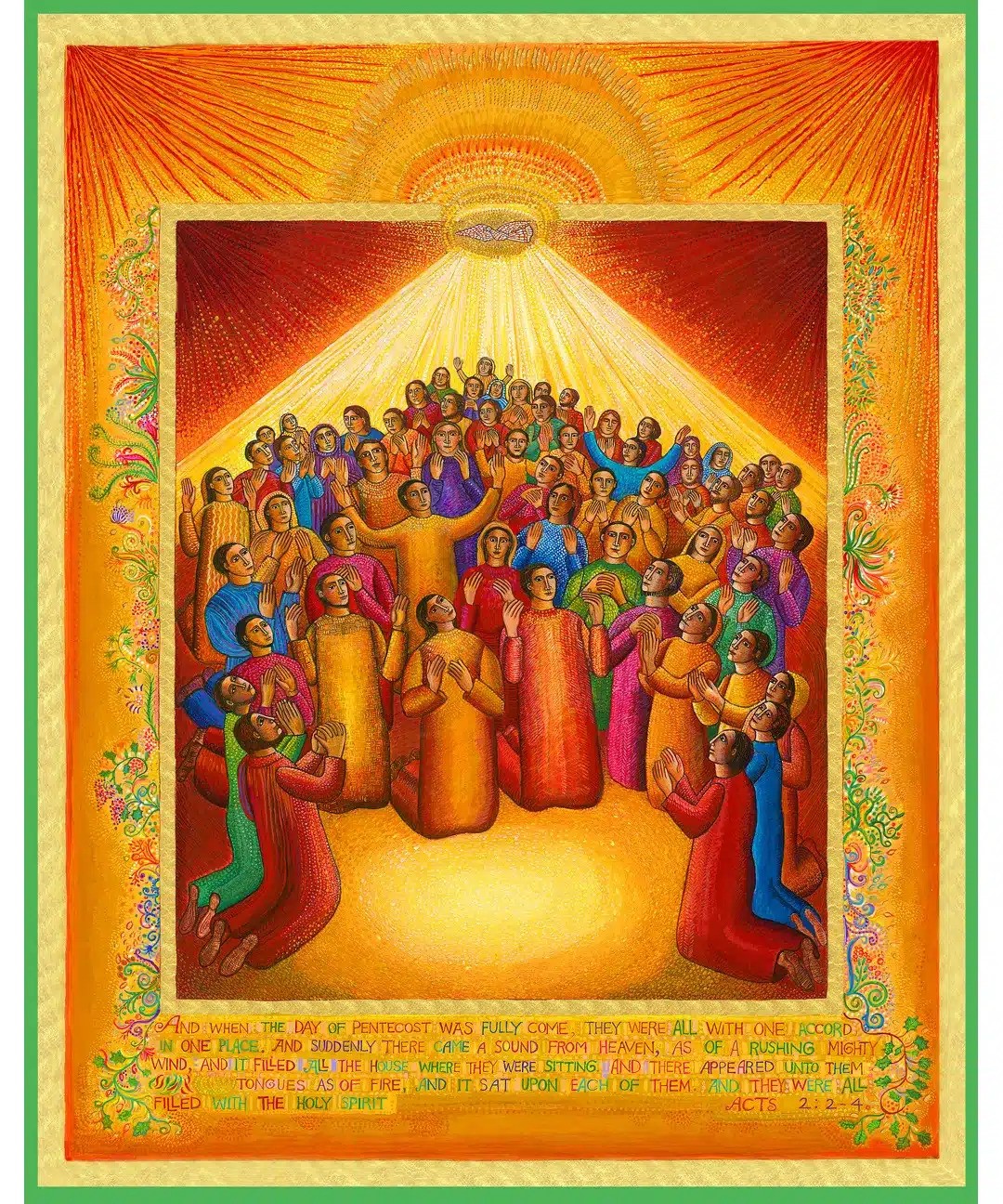by Admin
Share
Share

Come gather with us as we celebrate fresh winds of the Spirit in worship at the Chapel (2700 W 14th Street) on Sunday, May 19th, 2024 – on this fiftieth day of Eastertide – Pentecost Sunday.
To join us at the Chapel, buzz Zion Church (Bob Bucklew) from the Directory at the front of the 2700 Building on the campus of San Sofia apartments or enter from the accessible ramp from the rear parking lot. When you arrive, call Bob at 216-375-5323 to open the parking lot gate.
The Sunday Bulletin is attached in PDF format. You may use it as a devotional during the week.
“Pentecost (from a Greek word for “fiftieth”) is the fiftieth and last day of the Easter season. Next week is Trinity Sunday, and then nearly six months of “Ordinary Time” begins, during which this year’s walk through the Gospel of Mark (and occasionally John) will continue. From ten thousand feet, the Christian Year appears divided almost in half: about six months of holy seasons (Advent, Epiphany, Lent, Eastertide), and about six months of Ordinary Time. Like a pendulum swinging back and forth, or a pair of lungs breathing in and out, the church alternates between these two movements each year: high holidays and everyday life, the joys of celebration and the sometimes repetitive work of growth.
Pentecost is the Christian rendition of the ancient Jewish pilgrimage festival, the Festival of Weeks, or Shavuot (pronounced “sha-voo-OAT,” the last syllable rhyming with “coat”), celebrated 50 days after Passover. For the ancient Israelites, this festival was an explicitly inclusive harvest celebration (Deut 16:11; Lev 23:16), and over time, it also came to mark the reception of the Torah at Mount Sinai. For Christians, it celebrates the reception of the Holy Spirit and the birth of the church. Happy Birthday!” (“What Does This Mean?” SALT’S Commentary on Pentecost, May 13, 2024).
The Focus Scripture Reading is John 17:6-19
Jesus prays for the disciples in these verses of John 17 – a portion of Jesus’ “High Priestly Prayer,” the culmination of his farewell discourse to the disciples. The setting is the Upper Room on Maundy Thursday. Jesus has just washed the disciples’ feet, foreseen Judas’ betrayal, predicted Peter’s denial, promised the disciples the Holy Spirit, and offered them urgent words of instruction. Time is running out, and Jesus knows it.
The atmosphere in the room, if we take the liberty of imagining it, is quiet, tender, anxious, pensive. Jesus is troubled, full of pain at the prospect of saying goodbye to his friends, and the fervor of his words and gestures is the passion of a lover. Even as he knows that his life on earth is drawing to a close, Jesus yearns to remain in communion with his beloved. As part of his final discourse with the disciples, Jesus prays for God’s protection to be with them as he is returning to God. Jesus prays that they would be one, as he is one with God. Jesus has sent them out into the world with God’s word, and the world has hated them, but they do not belong to the world, they belong to God. However, Jesus prays that they might be sanctified in truth and protected.
Our Focus Scripture Reading on this Pentecost Sunday: Acts 2:1-21
The community of disciples is gathered because of the Festival of Weeks (Shavuot). Jesus had promised the arrival of the Holy Spirit not long after his departure — and sure enough, on the festival day itself, the Holy Spirit arrives. The scene is spectacular and chaotic: a violent, rushing sound like wind, and then “something appeared to them that seemed like tongues of fire; these separated and came to rest on the head of each one” — not a fire that destroys, but rather a fire like the one Moses encountered at the burning bush, which was “blazing, yet it was not consumed” (Exodus 3).
The Spirit’s most immediate, conspicuous effect is linguistic: many are empowered “to speak in other languages,” and at the same time, each person gathered hears the testimony in their native language. Think of a meeting at the United Nations, in which each person hears (through a headset) the proceedings translated into their mother tongue. The upshot of all of this is a sense of togetherness and unity: diverse as they are, everyone understands and can communicate, thanks to the Holy Spirit. Accordingly, they’re dazzled and taken aback, asking, “What does this mean?” (Acts 2:12).
As if to answer this question, Peter stands and speaks. He cites the prophet Joel, adapting those ancient words to illuminate the present: the final and decisive chapter of history has arrived, the dawn of God’s joyous Jubilee that Jesus declared early in his ministry (Luke 4:18-19), and now the pouring out of the Holy Spirit upon “all flesh.” Jesus both heralded and inaugurated this new era, and now the Spirit will empower a community through whom the movement’s message of healing, liberation, and joy will go out to the ends of the earth. The church is born!
On one level, from a Christian perspective, these events provide a new layer of meaning for the ancient harvest festival: the Spirit comes in order to gather in the sheaves of God’s great harvest of redemption. On another level, the story of Pentecost reverses the ancient story of Babel (Gen 11:1-9): in an arrogant attempt to “make a name for ourselves,” humanity tries to build a tower with its top in the heavens — and God scatters them by diversifying their languages. Here in Acts, instead of humanity presumptuously ascending toward heaven, God graciously descends to earth; and instead of humanity linguistically fragmenting, the Spirit brings us together, bridging divides so we can understand each other.
The Sermon/Reflection is “Hear What the Spirit Is Saying” by the Rev. Scott Rosenstein, based on the reading of Acts 2:1-21.
“The birthday of the church is a perfect time to reflect on what ‘the church’ is in the first place. The Acts reading points toward a portrait of the church as a dynamic community of people following Jesus, empowered by the Holy Spirit to carry out God’s mission of healing, liberation, and joy for the sake of the world.
This community is strikingly inclusive and egalitarian. The Jews Peter addresses are immigrants and visitors from all over the known world (“known” to Luke, that is!) who are now in Jerusalem, and the Jesus movement will soon open up to include Gentiles as well (Acts 10). Accordingly, Luke casts the church as a diverse, prophetic community of bridge-builders, visionaries, and dreamers, male and female, enslaved and free (Acts 2:17) — and soon enough, this egalitarian, communitarian ethos extends to the church’s social organization as well: “they would sell their possessions and goods and distribute the proceeds to all, as any had need” (Acts 2:43-47).
Likewise, this is a perfect week to reflect on how we understand the Holy Spirit. Luke’s portrait of the Spirit draws on ancient vision, in which God’s “breath” or “spirit” — both ru’ah in Hebrew — brings life, renewal, connection, and restoration, sometimes in sudden, disruptive fashion – such as Luke’s “suddenly they heard what sounded like a violent, rushing wind from heaven” (Acts 2:2).
But for all the drama, Pentecost is only the beginning: throughout the Book of Acts, again and again, the Spirit mobilizes the church and opens up new horizons for ministry. Breath means new life — and new life means new growth, change, and ongoing development. The Spirit protects and connects, but also challenges, provokes, and pushes us along. And thinking this way about life in the Spirit is the perfect segue into the nearly six months ahead of Ordinary Time, the season of everyday life and growth. So, “Happy Birthday,” yes — and also, “Let’s go!” The church is not a building, nor is it a particular membership or group of people. At its heart, the church is a mission, God’s mission — and the call, the challenge, the adventure continues. Let’s go!” (“What Does This Mean?” SALT’S Commentary on Pentecost, May 13, 2024)
Pentecost Blessings,
Pastor Scott Rosenstein
216-273-7561 – church
216-577-1514 – mobile
Bulletin Cover Image:
Pentecost serigraph
By John August Swanson, 2013
https://johnaugustswanson.com/catalog/pentecost2013/
Pentecost, 2013 (above) is based on a small etching from 1983. The Holy Spirit descends on the people gathered, as mighty winds and tongues of fire, enabling them to speak to all of the wonders of God.

